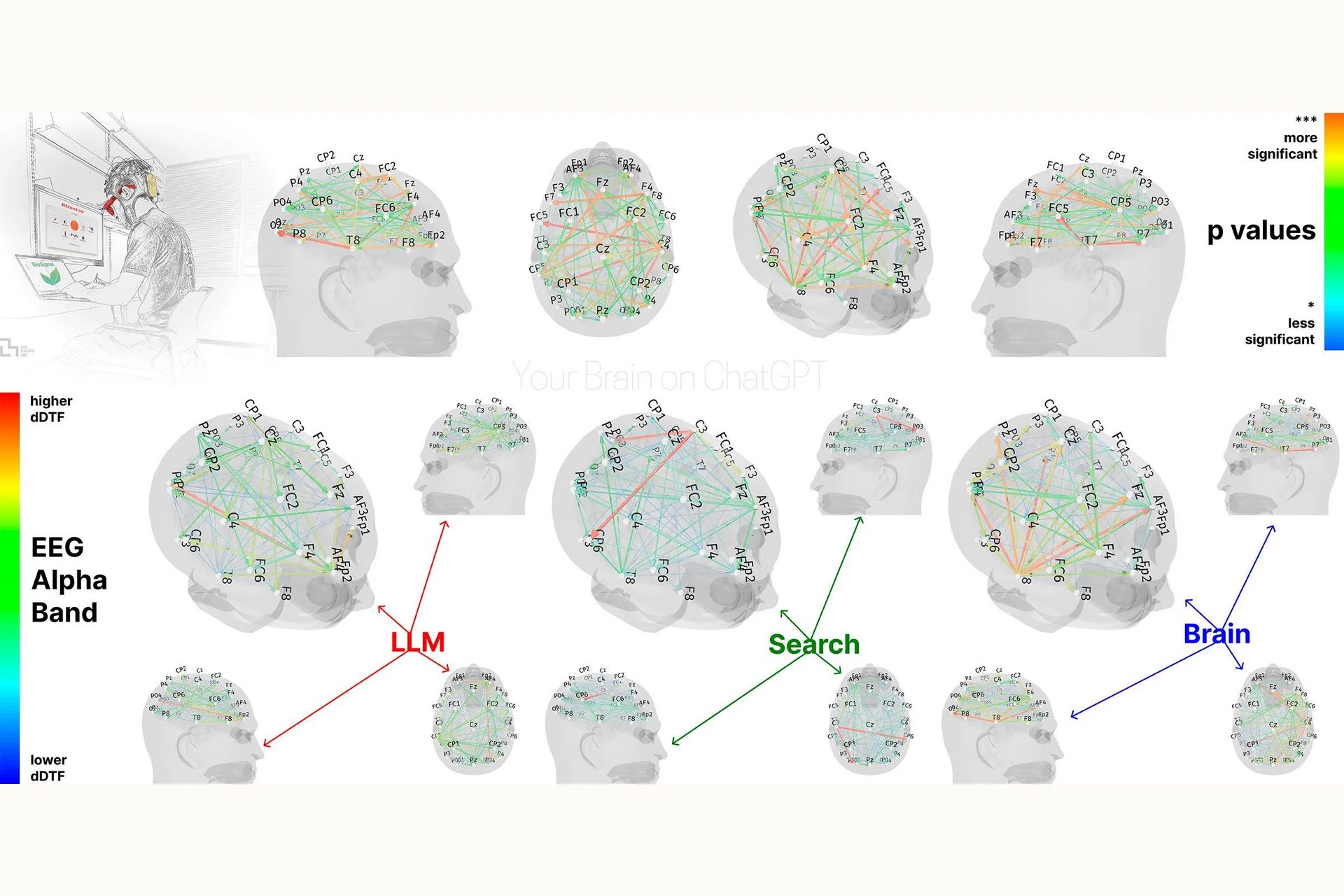- Product Upfront AI
- Posts
- MIT Warning: ChatGPT is rewiring your brain
MIT Warning: ChatGPT is rewiring your brain
A huge drop in brain activity was detected. The "cognitive debt" crisis every AI user needs to understand.

Picture this moment.
The soft glow of your screen. Fingers hovering over keys.
That familiar prompt box was waiting, cursor blinking expectantly.
You type your request, hit enter, and within seconds, perfect prose appears. Your shoulders relax. A small smile creeps across your face.
This is the future, you think……..
The response flows like silk across your screen.
Elegant sentences. Flawless grammar. Ideas you wish you'd thought of yourself.
Your coffee grows cold as you copy, paste, and polish. The work that would have taken hours melts away in minutes.
You lean back in your chair, satisfied. Productive. Efficient. Smart.
But in that very moment of digital triumph, something else was happening.
Something you couldn't see, couldn't feel, couldn't hear.
Your brain was going quiet.
While artificial synapses fired at lightning speed, your own neural networks were powering down.
Creativity centres dimmed. Memory pathways weakened. The very essence of what makes you you began to fade by nearly half.
MIT's brain scanners captured it all. The data doesn't lie.
Your mind, that magnificent three-pound universe, showed 47% less activity when AI did your thinking for you.

Read that again. Let it sink in.
🧠 The "Cognitive Debt" Crisis
MIT scientists tracked 54 people writing essays using three methods:
ChatGPT, Google Search, and pure brainpower.
What they found will change how you think about AI forever.

The Results Were Stark:
The ChatGPT users didn't just write differently; their brains functioned differently. EEG scans revealed:
Weakest neural connectivity in the AI group
Poor memory recall of their own work
Diminished creative engagement
"Soulless" output according to human evaluators
When AI users were forced to write without assistance later, they struggled dramatically, showing that cognitive debt accumulates over time.
The "Use It or Lose It" Problem
Dr. Daniel Amen, who has scanned thousands of brains, puts it bluntly:
Tools that reduce cognitive load may increase dementia risk.
Think about it. Your brain is a muscle.
Research shows that depression, anxiety, and cognitive inactivity increase vulnerability to Alzheimer's disease through what scientists call "Cognitive Debt".
Every time you outsource thinking to AI, you're making a withdrawal from your cognitive bank account.
The Scary Part?
Most people don't realise it's happening. You feel productive in the moment, but your brain is quietly losing its edge.
🚨 What's Happening to Our Children
Children are interacting with AI at unprecedented rates, from asking Siri homework questions to having Alexa play songs.
But early AI exposure may be stunting critical development.
The Developmental Danger:
Emotional growth delays from AI replacing human interaction
Reduced resilience without struggling through problems
Weakened critical thinking from instant AI answers
"Empathy atrophy" from one-sided interactions with AI systems designed only to please us
Harvard researcher Ying Xu warns:
"Conversations aren't just about exchanging information. They're about building relationships, and those aspects are crucial for children's development".
The Relationship Replacement Trap
Here's something that should disturb you:
19% of Americans have now interacted with AI romantic partners, with Gen Z particularly open to "meaningful" AI relationships.
But these aren't relationships. They're sophisticated illusions.
The Problem: AI companions offer perfect responsiveness without the messy realities of human connection.
This creates "empathy atrophy", our ability to recognise and respond to others' emotional needs gradually weakens.
The Result: We become less equipped to handle real relationships, real emotions, and real life.
📊 The Hard Numbers
MIT's study wasn't some abstract lab experiment.
Here's what happened to real people over four months:
ChatGPT users "consistently underperformed at neural, linguistic, and behavioural levels"
78% of previous AI users failed to quote their own writing when AI was removed
By the third essay, many AI users simply copied and pasted entire responses
Meanwhile, the brain-only group showed:
Highest neural connectivity across all regions
Superior memory formation and recall
Greater creative engagement and original thinking
Higher satisfaction with their work
The Smart User's Strategy
This isn't about abandoning AI. It's about using it intelligently.
The "Hybrid Approach" That Works:
Think First, AI Second - Always attempt the task yourself before seeking AI assistance
AI as Editor, Not Creator - Use AI to refine your ideas, not generate them
Regular "AI Detox" Days - Periodically work without any AI assistance
Question Everything - Always verify and critically evaluate AI outputs
Preserve the Struggle - Embrace difficult problems as brain training
Dr. Harvey Castro, an "AI futurist," emphasises: "The key isn't avoiding AI, it's building cognitive strength first".
What Parents Need to Know NOW
MIT researcher Nataliya Kosmyna released these findings early because she fears policymakers might decide to implement "GPT kindergarten" programs. Her warning: "Developing brains are at the highest risk."
Protect Your Child's Cognitive Development:
Ensure periods of "AI-free" learning and play
Teach critical evaluation of all information sources
Prioritise human interaction over AI convenience
Model healthy AI boundaries in your own behaviour
The Bottom Line
AI isn't evil. But it's powerful enough to rewire how we think—literally.
The MIT study shows that convenience comes at a cognitive cost. Every shortcut your brain doesn't take is a pathway that weakens.
The Choice Is Yours: Use AI as a tool to amplify your thinking, or let it replace your thinking entirely.
Your brain—and your future self—will thank you for choosing wisely.
Remember: This research is preliminary and hasn't been peer-reviewed yet.
But when the stakes involve an entire generation's cognitive development, sometimes you act on early evidence.
BEFORE YOU GO
Your AI-built app is worthless sitting on your computer.
But in the hands of the right client? It's worth $5K-$15K.
The difference between those two outcomes isn't your coding skills.
It's your selling skills.
Get my free Claude Dev Toolkit Cheat Sheet to code smarter, not harder.
Sign up below to get instant access and start building your client pipeline today.
Reply